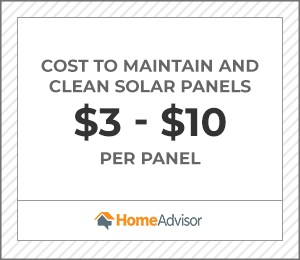Solar Panel Cleaning Cost
Homeowners spend an average of $150 to have their solar panels cleaned. Depending on factors such as roof slant, home height and system size, companies charge between $3 and $10 per panel. Some charge a flat rate within a range of $150 to $350. Annual inspections are typically $150 before the cost of cleaning.

These systems require minimal maintenance throughout the year. Most come with automatic monitoring which immediately alerts you to issues and low efficiency. However, it is important to get an annual inspection and cleaning to keep your system operating at peak performance.
A professional will be able to remove debris from the glass panels with the proper tools, soap, and water to prevent damage. They will also be able to assess any damage to the system and recommend next steps. Some amount of washing may be performed by the homeowner themselves, though it is important to call the solar installation company first. They can advise you on best practices for DIY work that won't void your warranty.
On This Page
Cleaning Service Prices
The typical charge is $3 to $10 per panel. Homeowners typically pay between $120 and $160 for this service alone. Contractors will often set a minimum price for a job, especially if it involves getting on the roof. This way, they cover their time and equipment costs regardless of how small the solar array is. Do not expect to pay less than $100 for this service.
For most systems, annual cleaning will be sufficient. However, areas that get less rain may have a more frequent need. The value of this service will be unique to each homeowner's specific circumstances.
The following conditions will affect your cost:
- System Location - Expect to pay less for ground-mounted units and more for those on two-story houses given the safety measures and extra labor involved.
- Level of Build-Up - If you haven't had service in several years, more work and supplies may be required.
- Size - A larger array will take more time to clean, adding to labor costs. A very small array will likely call for a minimum fee to cover the contractor's costs.
- Proximity to Contractor - If you are a far distance from the contractor's location, you may encounter a higher minimum fee than someone who lives within a 20-mile radius.
- Maintenance Agreement - You may have had the option to bundle a maintenance agreement with the purchase of your system. Bundling could lower your annual fee.
Consult with a pro to clean your solar panels
As mentioned, these systems will not demand much care throughout their lifetime. Cleaning is the primary concern. This equipment typically comes with a monitoring option which you can watch and measure yourself. With this monitoring ability, you can catch dips in energy output and equipment failures right away. If you notice a change, an inspection by a professional is the best way to make sure you solve the problem correctly. If you don't notice a change, an annual inspection could still turn up issues and you'll be glad you caught before they became more serious. Small cracks, for example, could leak moisture into your panels at a slow rate, causing failure that requires expensive repairs.
During an annual inspection, which averages $150, the contractor will check important components. They will search for corrosion, wear and loose wiring and bolts. They may find cracks in your panels or broken glass and suggest repair work or replacement. Solar panel repair costs average $650. Your inspector may also find that tree branches or new construction are obstructing the system's sun exposure. They may suggest tree trimming or even relocating your system on the roof.
Aside from an annual $150 inspection, the key to maintaining your solar equipment is keeping it clear to absorb as much sun as possible. These systems are built to be extremely durable and long-lasting. If the sun can reach them, they are set to produce energy for 20-25 years.
- Clear Obstructions. Fallen leaves and outstretched branches can block sunlight.
- Remove Build-up. Excessive pollen and debris can reduce your energy output.
- Monitor Changes. Check your monitoring system for output changes.
- Consider a Cleaning Robot. Automatically wash and rinse year-round.
DIY Cleaning Costs
The safest way to wash the equipment is from the ground with an extended, water-fed window washing pole. You must also be sure to use the right soap for optimizing energy output, leaving little to no residue and causing no damage or wear. If your hose water is hard--meaning that it contains a high mineral content--you will want to consider investing in a water treatment system before spraying your equipment.
- Water-Fed Pole: $500-$5,000*
- Water-Fed Brushes: $80-$175
- Soap: $30-$50
*Water-fed poles that are safe for this work vary greatly in price due to various factors such as length, material and accessories.
Aluminum poles, for example, are $300 at 16 inches and $600 at 41 inches. Carbon fiber poles are $1,000 at 30 inches and $2,000 at 45 inches. The more expensive poles have flexible and adjustable necks, as well as interchangeable brushes. Five thousand-dollar poles will come with rotating brushes, will be extra light and easy to manage and will come with accessories like carrying bags and spare jets.
Some solar experts say that you only need a hose, a soft sponge and some soap accomplish this task. The best advice is to contact your installer for their recommendations. Using the wrong tools could result in a voided warranty, especially if you end up damaging your panels. The wrong soap could leave residue, an over-pressurized tool could push moisture inside the unit and rinsing panels with hard water could cause scaling.
Tip: Do not wash the panels when they are hot. The panels could burn you. Plus, the soap and water will dry fast and leave behind residue. Perform this work on an overcast day or early in the morning.
Some homeowners would benefit from buying a robot or automatic cleaning system.
- Cleaning systems look like sprinklers and can be programmed to wash or rinse at the frequency you need. Heliotex, one of the leading brands in this market, has products which are compatible with any size and nearly any brand of equipment. The company offers a unique quote for each home system.
- Robots, on the other hand, have the capacity to wash your panels daily with or without the use of water. Some run on tracks, while others are scrubby autonomous robots. Most run on solar energy. This technology is growing rapidly, especially in desert environments where large businesses rely heavily on their solar energy output.
Hire a Cleaning Professional to Service Your Solar Panels
If you are leasing your system, the solar company will be responsible for repairs and regular maintenance. If you own your system you will most likely be responsible. Unless you bundle an annual inspection and maintenance agreement, cleaning and inspecting the system are usually not included in the warranty.
It's best to read the warranty offered by a company before you choose them for your system purchase and installation. The three types of warranties include performance, workmanship and equipment.
- Performance. Ensures that your system will operate at a certain level of efficiency throughout its lifetime.
- Workmanship. Guarantees coverage if your equipment is not installed correctly.
- Equipment. Covers components such as the inverter and panels should they fail.
Your homeowner's insurance, on the other hand, should cover a good portion of repairs in the event of a downed tree limb or inclement weather. Be sure to check for or add this coverage when you have panels installed. For the most part, your insurance should already cover this feature and your premium will not go up. However, considering the cost of installing solar panels, you may want to raise your coverage limit. Homeowner's insurance does not typically cover cleaning or maintenance.
Be sure to read the fine print of both your warranty and insurance, as each company has its own stipulations and exclusions.
Hire a Cleaning Professional to Service Your Solar Panels
Do I Need to Clean My Panels?
Yes. Just like dust gathers on your shelves and window sills, environmental debris is constantly building up on your panels and decreasing their efficiency. While some may only see a slight increase in output after washing, other homeowners report up to a 30% increase in efficiency.
How Often Do You Need to Clean Solar Panels?
It's recommended that they be serviced annually. There are environments where bi-annual service would be best, such as in dusty and arid climates. There are also areas where service can be less frequent, such as in rainy climates.
How Do You Remove Snow from Solar Panels?
Experts usually advise against removing snow yourself. Even a gentle sweeping with the wrong equipment could permanently damage the glass and could compromise your warranty. In many cases, the snow will melt and fall away on its own.
If you wish to clear the units yourself, be sure to invest in a proper snow roof rake designed for the job. These cost anywhere from $30 to $150 and are available in materials like fiberglass, aluminum and polycarbonate. Be sure to exercise extreme caution navigating your roof. If you wish to prevent the problem altogether, consider installing an automatic cleaning system.
Can You Pressure Wash Your Roof with Panels?
You should not spray this equipment with high-pressure water. The pressure could damage your panels and get moisture into vulnerable areas. Pressure washers can also damage your roof shingles.



